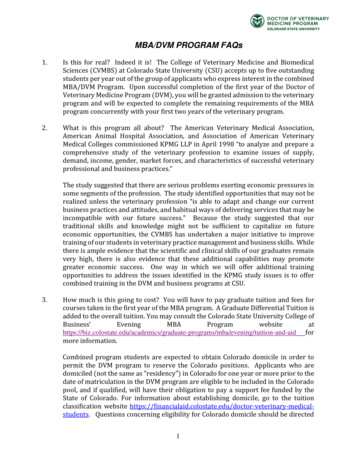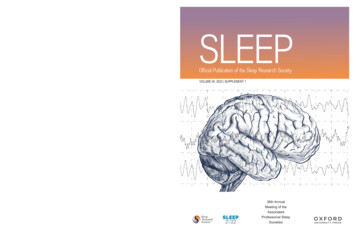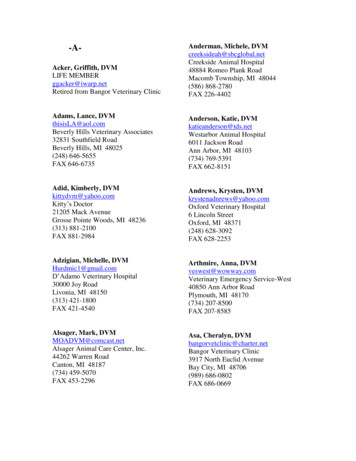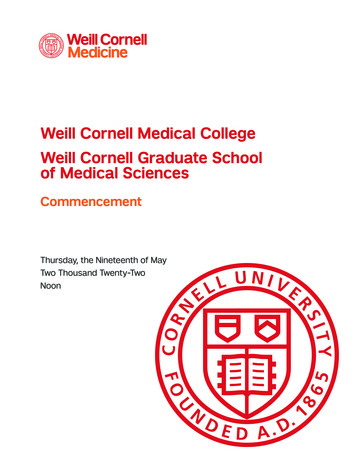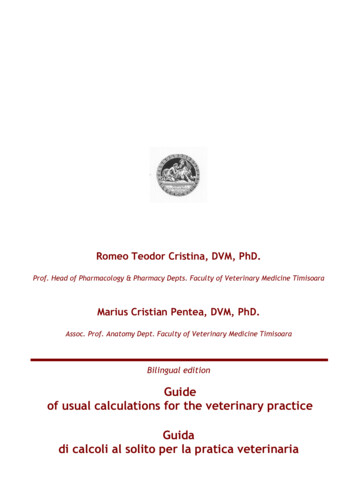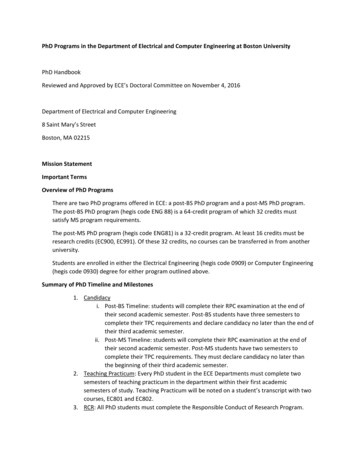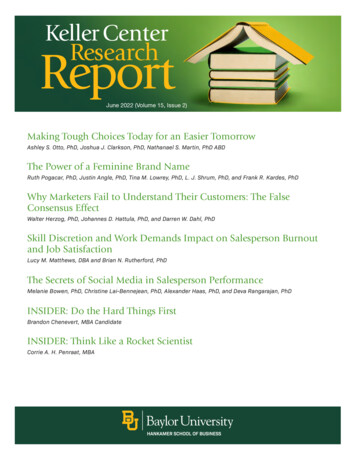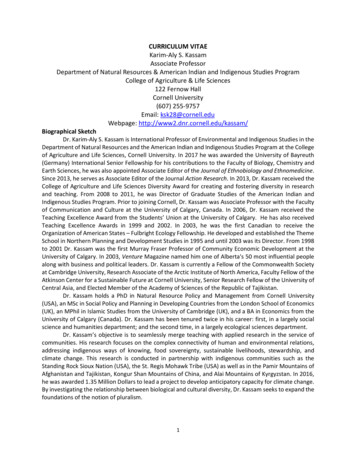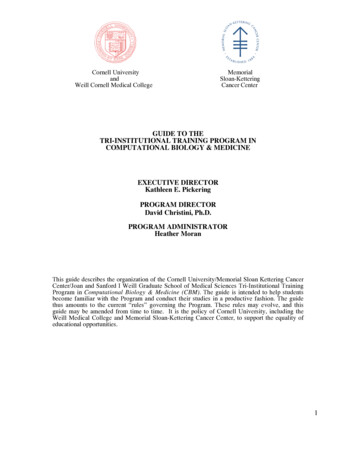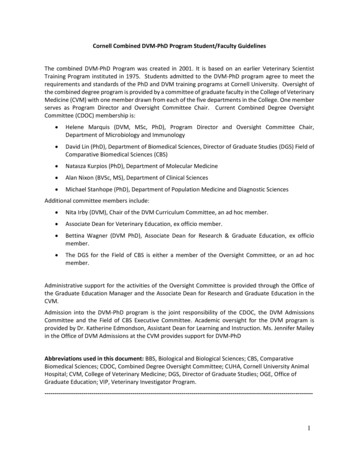
Transcription
Cornell Combined DVM-PhD Program Student/Faculty GuidelinesThe combined DVM-PhD Program was created in 2001. It is based on an earlier Veterinary ScientistTraining Program instituted in 1975. Students admitted to the DVM-PhD program agree to meet therequirements and standards of the PhD and DVM training programs at Cornell University. Oversight ofthe combined degree program is provided by a committee of graduate faculty in the College of VeterinaryMedicine (CVM) with one member drawn from each of the five departments in the College. One memberserves as Program Director and Oversight Committee Chair. Current Combined Degree OversightCommittee (CDOC) membership is: Helene Marquis (DVM, MSc, PhD), Program Director and Oversight Committee Chair,Department of Microbiology and Immunology David Lin (PhD), Department of Biomedical Sciences, Director of Graduate Studies (DGS) Field ofComparative Biomedical Sciences (CBS) Natasza Kurpios (PhD), Department of Molecular Medicine Alan Nixon (BVSc, MS), Department of Clinical Sciences Michael Stanhope (PhD), Department of Population Medicine and Diagnostic SciencesAdditional committee members include: Nita Irby (DVM), Chair of the DVM Curriculum Committee, an ad hoc member. Associate Dean for Veterinary Education, ex officio member. Bettina Wagner (DVM PhD), Associate Dean for Research & Graduate Education, ex officiomember. The DGS for the Field of CBS is either a member of the Oversight Committee, or an ad hocmember.Administrative support for the activities of the Oversight Committee is provided through the Office ofthe Graduate Education Manager and the Associate Dean for Research and Graduate Education in theCVM.Admission into the DVM-PhD program is the joint responsibility of the CDOC, the DVM AdmissionsCommittee and the Field of CBS Executive Committee. Academic oversight for the DVM program isprovided by Dr. Katherine Edmondson, Assistant Dean for Learning and Instruction. Ms. Jennifer Maileyin the Office of DVM Admissions at the CVM provides support for DVM-PhDAbbreviations used in this document: BBS, Biological and Biological Sciences; CBS, ComparativeBiomedical Sciences; CDOC, Combined Degree Oversight Committee; CUHA, Cornell University AnimalHospital; CVM, College of Veterinary Medicine; DGS, Director of Graduate Studies; OGE, Office ofGraduate Education; VIP, Veterinary Investigator ---------------------------------------------1
TABLE OF CONTENTSI.Introduction . 4II.Goals and Organization of the DVM-PhD Program 5A. Elements of the Training Program 5B. Important Milestones .7C. Timeline Alternatives and Exceptions 1. DVM Students Entering the Combined Degree Program 2. Cornell Graduate Students Entering the Combined Degree Program .3. Extending the Thesis Research period -Track 1 4. Extenuating Circumstances 77888D. Financial Support8III. Guidance and Counseling for DVM-PhD Students .A.General Guidelines for Finding Support Personnel and Resources .9B.Faculty Advisors (during DVM training) 9C.The Advisory Committee .9D.The Graduate Special Committee .9E.The Career Counseling Committee (CCC) .9IV. The Veterinary Medicine Curriculum V.810A.Foundation Courses 10B.Distribution Courses 11C.Clinical Rotations .11D.Clinic Rounds .12 .12Graduate StudyA. Laboratory Rotations B. Choosing a Thesis Advisor12 .13C. Graduate Special Committee .13D. Graduate Coursework .14E. Graduate School Requirements and Field Recommendations 15F. Publications 15VI. Integration of DVM and PhD Studies .15 .16B. Distribution Courses 16C. Clinical Training Opportunities 16 .16A. Laboratory RotationsD. Teaching Requirement2
E. Requesting Transfer of Credit .VII. Evaluation .A. Grade expectation1717 17B. Laboratory rotation evaluations .17C. Annual progress reports17 .D. Admission to candidacy examination .18E. Defense of thesis 18VIII. Transitions 18IX.X.A.Matriculation into the DVM-PhD Program 18B.From professional program to graduate school .18C.From graduate school to professional program 19D.From DVM-PhD program to postgraduate clinical/postdoctoral training 19Administrative Issues .20A.FundingB.Interview/RecruitmentC.Publications and Acknowledgements .20D.Vacation .20E.Sick leave .20F.Parental leave 21G.Unpaid leave 21H.Withdrawal from the program .21I.Protection of intellectual property rights .21Appendices . 2020start at 22A. Getting Started: Summer Programs and Research Rotations 1. Veterinary Investigator Program .2. Leadership Program .B. Outline of the 7 Year Training Program for DVM-PhD Students .22222223C. Advice on Preparing Petitions 1. Research for DVM Course Credit .2. Extension of Thesis Research Period .242424D. DVM Curriculum .25E. Professional Responsibilities and Conduct .263
I. INTRODUCTIONOur academic objective is bold: we seek to integrate the most rigorous basic scientific and clinical trainingso that our graduates will be at the forefront of biomedical science and the veterinary profession inacademic research, medicine and teaching; government service and public health; or thebiotechnology/pharmaceutical industry. Our Program takes advantage of Cornell's uniquelyinterdisciplinary environment to integrate clinical training at the nation's top-ranked veterinary schoolwith the University's internationally-recognized strengths in biochemical, cellular and molecular biology,biomedical engineering, cancer biology, epidemiology, ecology, food sciences, genomics, infectiousdisease and immunology, nanotechnology, neurosciences, zoology and wildlife conservation amongothers.For students, the benefits of Cornell's Combined DVM-PhD Degree Program include: training in basic sciences in order to improve fundamental biological understanding and to learnhow to ask and test scientific questions appropriately; acquisition of a systems knowledge of anatomy, physiology, medicine and surgery that willenable students to understand biological processes and disease conditions from subcellular toorganismal levels; understanding of the similarities and differences between species, enabling students to utilizecomparative approaches to science and medicine; clinical training which facilitates identification of areas in need of research to benefit animal andhuman health; integration of basic science and clinical studies should decrease the time required to earn twoadvanced degrees in an environment where outstanding DVM and PhD training is available; financial support during the DVM studies currently consisting of health insurance and summerstipends during research rotations. In addition, the CVM will forgive all loans associated with theDVM tuition when both the DVM and PhD are completed. If a student is already in the DVMprogram when accepted in the combined degree program, the DVM tuition will be covered forthe years that the student was part of the combined degree program; financial support during the graduate studies consisting of graduate school tuition, stipend andhealth insurance provided by the faculty mentorClinical medicine and laboratory research have many rewards – but also potential frustrations. The CVM’sDVM-PhD Program recognizes that a scientific career is a challenging undertaking. In addition to thosecommon among all professional careers, there are particular challenges associated with combineddegree careers because the training is long and it is difficult to manage the conflicting demands of clinical,laboratory and personal responsibilities. During your training, we provide guidance for how to plan yourstudies, and suggest ways to deal with many problems you are likely to encounter, while attempting topreserve the flexibility necessary to permit integration and completion of two advanced degrees in atimely manner.The Cornell DVM-PhD Program is centered in the CVM and is comprised of the College’s DVMProfessional Program and Cornell’s Graduate School. The unique structure of the Program provides youwith extraordinary resources and opportunities. It also is a source of challenges that we hope to minimizewith this Guide. Please note, this is only a guide – not a substitute for the policies that govern youreducation and training in the DVM Program or in your PhD field. These policies will be reviewed annuallyand updated regularly. It is your responsibility to abide by them for each of the training components as4
they are applied during the period in which you are enrolled. While it is the intention of all involved tohonor agreements made at the time you matriculate in the DVM-PhD program, some changes in theVeterinary Medicine curriculum may occur that are particular to the DVM class you are associated with.These may include, but are not limited to, addition or deletion of distribution courses, changes inscheduling of clinical rotation and distribution course blocks. During the graduate program, most of theguidance in this document is based on expectations for students in the graduate Field of CBS, which ispart of the Biological and Biomedical Sciences (BBS) Program based in the CVM. Be aware that othergraduate fields may have different expectations for their PhD students.II. GOALS AND ORGANIZATION OF THE DVM-PhD DEGREE PROGRAMThe goal of the DVM-PhD Program at Cornell University is to train the next generation of leaders inbiomedical research – and to do so in a manner that promotes an effective intellectual dialogue betweenstudents and faculty researchers and clinicians. Graduates of the Program will have excellent researchcredentials and be well qualified for the practice of veterinary medicine if they decide to combineresearch with veterinary practice. This program is designed to be completed in 7-8 years (see AppendixB). Thus, considerable interplay of DVM and PhD studies is necessary for the student to make efficientprogress through the program. Successful integration of PhD and DVM studies requires an appreciationthat the mission of the graduate program and the professional curriculum are not entirely congruent.This section of the guidelines is an introduction to how the DVM-PhD program attempts to combineimportant parts of graduate and veterinary medical studies. In addition to a set of milestones below,strong proactive mentoring (see section III) is essential for students to complete the program in a timelyway.A. Elements of the Training ProgramThe main components of the DVM-PhD program are the DVM studies comprised of course work,laboratory exercises and clinical training, and PhD studies which include laboratory rotations, graduatecourses, proposal writing (A-exam), thesis research and writing, and thesis defense (B-exam). An outlineof the 7 years of the training program can be found in Appendix B.Combined DVM-PhD students are required to do their first research rotation during the summer of Year1. In consultation with the Program Director and the DGS of CBS, the student should arrange for aresearch rotation as soon as he/she has matriculated into the program. It is imperative that the studentseeks to rotate in labs that are well funded for research and that can financially support a graduatestudent. The student should also apply to the Cornell Veterinary Investigator Program (VIP) to receive asummer stipend (see Appendix A). This first research rotation should be completed by mid-August priorto entering the DVM program.The second and third research rotations need to be completed by the end of the summer between year1 and 2 of the DVM program. Stipend support for the summer will be arranged by Associate Dean BettinaWagner and may be through one of the organized programs: VIP, the Cornell Leadership Program (seeAppendix A), or another mechanism. Again, students should consult with the Program Director and theDGS before submitting their rotation selection so that they can ensure a rotation that is worthwhile tothe student’s career goals. At the end of this third rotation, the student should select a thesis mentor inconsultation with the Program Director and the DGS. All DVM-PhD students are required to select a thesismentor before entering the 2nd year of the DVM program.5
Students enter graduate school in January of Year 2.The Research Years - January of Year 2 to January of Year 5: DVM-PhD students must keep contact withthe Office of Graduate Education (OGE) and Ms. Paige Frey, the College Registrar, to ensure they makesmooth transitions between the DVM Program and the Graduate School. It is important to note that theadministrative mechanics will change to the Graduate School once in the PhD Degree Program and allprogram requirements must be fulfilled according to the Graduate School.DVM-PhD students are on an accelerated track when they enter their research years, and it is advisedthat they select their Special Committee no later than the summer of Year 3. The function of thiscommittee is to guide students and evaluate their progress. Detailed information about this committeecan be found in section V-C.A first committee meeting should be scheduled before July 1st of Year 3. This way, the student, theiradvisor and the committee members can discuss the plans for the thesis research and any other issuesthat might be relevant. Thereafter, the committee should meet at least once a year. A progress reportmust be completed and distributed to the committee members, to the OGE, and to the Combined Degreeprogram director before the meeting, no later than July 1st of each year. In addition, the results of themeeting must be distributed to the same entities. The forms for these reports are available on the BBSwebsite: annualstudentreport.cfmAfter completing three semesters of graduate study the student will prepare a formal research proposalfor their Special Committee and defend it in an oral examination (the A-exam). The A-exam proposalformat is specified in the guidelines published by the graduate field on their website. The A-exam shouldbe completed before the end of Year 3. See section VII-D for more details.Students are responsible for scheduling their Committee meetings and the A-Exam. It is the policy of theDVM-PhD Program that a student who fails to convene their Committee annual meeting by July 1st ofthe academic year or to complete the A-exam before the end of Year 3 will be considered to be in pooracademic standing, unless they have received explicit permission to have the meeting or exam at a laterdate. All students are strongly encouraged to make sure that their Committee meets in a timely manner,and that the reports are submitted to meet this deadline. Given the difficulties associated withcoordinating the calendars of very busy people, students are advised to begin scheduling the Committeeseveral months in advance of the meeting – and to send out reminders.Research proceeds at an unpredictable pace, which often is slower than students expect; but studentstend to be optimists. The Committee meetings therefore are important, as they provide for periodicassessments of the rate of progress – by people outside the laboratory. If the student, or theirCommittee, is concerned about the rate of progress, it is advised that Committee meetings be scheduledtwice a year, so that the rate of progress can be monitored more closely. The decision whether thestudent can defend their thesis in the fall semester of Year 5 or in the summer of Year 6 usually wouldbe made during a committee meeting.Students are expected to have completed their thesis research if not their thesis document beforereturning to the DVM curriculum in January of Year 5. However, if a student in good standing is not readyto return to the DVM program at that time, and they have sufficient evidence that they will be able tofinish their research if granted an additional year, they may petition the CDOC and the DVM CurriculumCommittee for a 1-year extension of their thesis research period. If they fail to do this in a timely way,they must return to the DVM class. Failing to petition, or return to the DVM class will requirereapplication for admission to the DVM program. Information regarding petitions can be found inAppendix C.6
Completion of the DVM program – January of Year 5 – May of Year 7. Combined Degree students areexpected to return to the veterinary curriculum in January of Year 5, which corresponds to the Springsemester of second year of the DVM program. In the summer preceding their return to the DVMcurriculum, students must inform Dr. Kathy Edmonsdon and Ms. Paige Frey of their intentions. Summerof Year 6 is available to finish writing the thesis and take the B-exam if necessary.Remember, students may take a few DVM Distribution Courses during the 3 years they are in graduateschool. This is important because some of these courses are preparatory for Block Va. This is alsoimportant to maintain the integration of the veterinary and graduate research curriculum.B. Important MilestonesIt is expected that each DVM-PhD student will: Begin seeking guidance from the Combined Degree program director and from the DGS of CBSwithin weeks of acceptance into the DVM-PhD program to select a laboratory for their 1stresearch rotation Successfully complete one summer research rotation prior to entering the DVM Program (viaVIP) Continue seeking guidance from the program director and DGS to select 2nd and 3rd researchrotations Successfully complete a second and third research rotation before beginning the 2nd year of theDVM program Choose a research mentor by the end of the third rotation Begin the PhD degree Program in January of Year 2 Form a Special Committee in the summer of Year 3 Have a Special Committee meeting before July 1st of Years 3-6 Take the A-exam before the end of Year 3 Take DVM distribution and graduate courses while in graduate school Return to the DVM curriculum in January of Year 5 Take the B-exam before the fall semester of Year 6 Finish the DVM program in May of Year 7C. Timeline Alternatives and ExceptionsStudents who matriculated in DVM curriculum or to PhD program at Cornell prior to joining the DVMPhD program will have essentially the same timeline as other combined degree students.1. DVM Students Entering the Combined Degree Program would have to demonstrate theircommitment to research, either by having participated in the VIP or Leadership Programs, and/ordoing research part time while in the DVM class. The number of research rotations required willbe pro-rated by the number of labs they have done research projects in before being accepted intothe program. Thus, it is likely that 1st year DVM students will be credited with one research rotation.7
They will be expected to complete their additional research rotations by the end of the summerafter entering the program and select a thesis mentor.2. Cornell Graduate students Entering the Combined Degree Program are expected to havecompleted 3 laboratory rotations and selected a research mentor prior to starting the DVMcurriculum. During the first year of Vet School these students are expected to pursue thesisresearch during summers and Distribution Course periods.3. Extending the Thesis Research Period. If a student, their research mentor and their SpecialCommittee are in agreement that the student’s research will benefit significantly by a one yearextension of the research period, or if their research would be jeopardized by leaving a highlycompetitive ongoing project in an unfinished state, the student must submit a written petition firstto the CDOC, which will judge its suitability for support before the DVM Curriculum Committee(see Appendix C).4. Extenuating Circumstances. The Oversight Committee recognizes that life is not always smoothand sometimes extenuating circumstances will arise that will alter the most carefully laid plans.Students are encouraged to consult with their research mentor, the DVM-PhD Program Director,and/or the DGS regarding any difficulties that they may encounter that are likely to affect theirprogress through the Program.D. Financial SupportDuring the DVM program, an individualized financial support package is prepared annually for eachstudent by the Director of Student Financial Planning, Ms. Carol Gary. Part of the financial aid packageincludes a loan for DVM tuition from the CVM starting the year that the student enters the program. Theloan is forgiven once the DVM-PhD students successfully complete both their DVM and PhD degrees. TheCollege will provide health insurance during the DVM program.During the PhD program, DVM-PhD students receive full graduate tuition, health insurance and stipendsupport from research funds supplied by their research mentor. Therefore, it is very important to selecta research mentor whose funding is sufficient to cover these funds for the duration of the PhD. It is alsoexpected that students will apply for graduate funding to an appropriate funding agency (NIH, USDA).During the fall semester of Year 3, students will take BIOAP 6100, a 3-credit course in which they willwrite a research proposal to be submitted for external funding. Resources for conducting research arethe responsibility of the research mentor. (see section IX, Administrative Issues)III. GUIDANCE AND COUNSELING FOR DVM-PhD STUDENTSA. General Guidelines for Finding Support Personnel and ResourcesThe OGE, which is managed by Arla Hourigan and staffed by Cindy Grey, generally should be the startingpoint for all information gathering by DVM-PhD students – in particular for students in their early yearsin the Program. Each student will also be assigned a current DVM-PhD student as mentor. In addition,the DVM Office of Student Services, which is directed by Dr. Jai Sweet, is a resource for DVM-PhD Degreestudents.8
The Chair of the CDOC acts as the Program Director. He/she serves as an effective liaison between theDVM Program and the Graduate School. Questions relating to academic guidance usually are referred tothe Program Director or the DGS. In addition to these formal mechanisms, DVM-PhD students areencouraged to consult with their laboratory research advisors and student advisors.B. Faculty Advisor (during DVM training)Each student in year 1 of the DVM program is assigned a Faculty Advisor. The Student Handbook,published annually in the College, contains a list of all of the requirements, policies and opportunitiesthat pertain to your DVM education. Because the DVM curriculum is highly structured, with a list ofrequired courses and laboratories, students do not always choose to consult with their assigned facultyadvisor. Rather, they self-select one or more faculty advisors on an informal basis and consult directlywith Ms. Paige Frey, the College Registrar regarding scheduling of courses and clinical rotations.However, it is your faculty advisor who will be your advocate if for some reason you have any concernswith a course leader or circumstances require you to bring a formal appeal to the College faculty. It isimportant to inform a member of Dr. Jai Sweet’s office if you change your faculty advisor. You shouldalso inform the OGE and the program director about your faculty advisor.C. The Advisory CommitteeThe director of the program and the DGS of CBS will begin advising students before the first summerrotation. Students need to select their thesis research advisor before the end of the second summer.When a student select a thesis mentor, the CDOC will meet together with the student and the mentor tooutline the expectations and responsibilities of the student and mentor in the DVM-PhD program.D. The Graduate Special CommitteeThis committee of graduate faculty is established by the student and their research mentor (see sectionV-B, Choosing a Thesis Advisor,). The purpose of this committee is to guide the student through their PhDtraining. DVM-PhD students are on an accelerated track when they enter their research years, and it isadvised that they select their Special Committee no later than June 1st of Year 3. The function of thiscommittee is to guide students and evaluate their progress. More detailed information about thiscommittee can be found in section V-C.E. Career Counseling Group (CCG)This is an informal group made up of faculty selected by the student for mentoring. Members of thisgroup are faculty who have mentored the student during their DVM-PhD studies and who will be able toprovide continuing advice on the student's long-term career planning and goals (post-graduate researchand clinical training, etc.). The typical CCG should be 4 or 5 faculty members including the student's PhDresearch advisor and other faculty members who have knowledge of their talents as an educator,researcher and clinician. Remember, it is essential to build and maintain your professional contactnetwork to facilitate letters of recommendation for fellowships and grant applications, and forpostdoctoral or residency positions, as well as to search committees when you are seeking your firstposition. Each student is encouraged to provide the names of their mentors to the OGE on their annual9
report form so that the Office staff has up to date information when they need to organize letters ofrecommendation.IV. THE VETERINARY MEDICINE CURRICULUMThe professional curriculum at Cornell reflects the leading edge of scientific knowledge and clinicalmedicine. It is comprehensive, interdisciplinary, and continually evolving to prepare veterinarians topursue diverse career paths within the veterinary profession including basic and/or translationalresearch. It provides a broad-based education in all of the traditional subjects and, in an era of increasingspecialization, gives students the opportunity to develop an area of greater expertise. In addition to astrong foundation in biomedical and clinical disciplines, the educational program also emphasizesimportant related topics in veterinary medicine including communication skills, client relations, ethics,public health, practice management, and professional development.The goals of the professional curriculum at Cornell are to: provide each student with the knowledge and skills that form the foundation on which to builda career in the profession; foster critical thinking and scientific curiosity; inculcate a rigorous approach to problem solving; emphasize the scientific principles underlying veterinary medicine; foster habits of self-education and lifelong learning; stress preventative as well as curative medicine; promote ethical behavior and a sensitivity to the role of the veterinarian in society; provide each student with a broad general veterinary education, but also the opportunity topursue an area of interest from among the many opportunities available to veterinarians; teach students to recognize the limits of their skill and knowledge and to make effective use ofadditional resources and expertise.These goals are achieved through the design of the curriculum and the flexible structure of Foundationand Distribution courses. The teaching formats, in particular the incorporation of small group learningand collaborative work, foster self-education, problem solving, and help students recognize the limits oftheir knowledge and skills. Preclinical courses use clinical cases to fuel scientific curiosity, whileemphasizing the scientific principles that underlie medicine. In this curriculum, students become activelyengaged -- working independently as well as with faculty and peers. The rich learning environmentproduced by these teaching approaches helps students assume greater responsibility for their education,learn to use additional resources, and fosters habits of lifelong learning.The College has modern and well-equipped teaching and clinical facilities, and draws upon faculty whoare dedicated teachers and leaders in their respective fields. A variety of educational resources areavailable to support student learning; these are readily accessible to students at all hours. CornellUniversity Hospital for Animals (CUHA) is equipped with state-of-the-art equipment that allows for themost up to date diagnostic and therapeutic procedures on inpatients and outpatients. Under thedirection of the clinical fac
the Graduate Education Manager and the Associate Dean for Research and Graduate Education in the CVM. Admission into the DVM-PhD program is the joint responsibility of the CDOC, the DVM Admissions Committee and the Field of CBS Executive Committee. Academic oversight for the DVM program is
